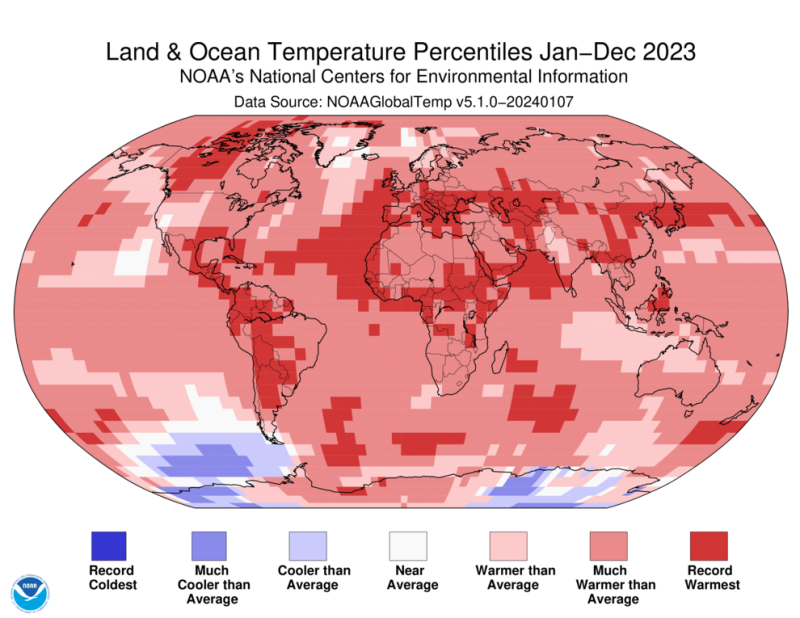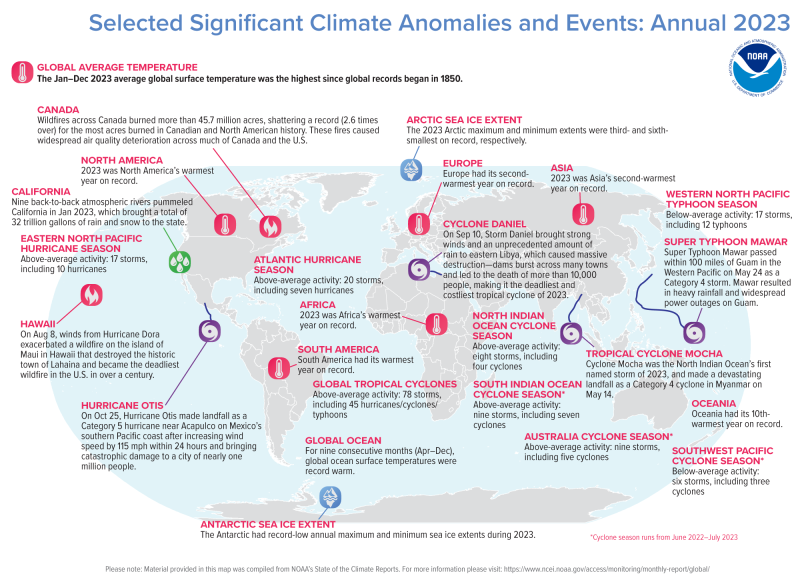2023 Declared Hottest Year by Five Organizations

Depositphotos
Officially declared, 2023 has become the hottest year on record. Independent assessments from NASA, NOAA, WMO, Copernicus, and the UK Met Office all arrived at the same verdict. Additionally, the year set various records and witnessed a series of intense weather events worldwide.
Each organization utilizes slightly different datasets and methodologies, leading to slight variations in the specific figures they derive. Nevertheless, all five unanimously concurred that 2023 surpassed the previous record-holder, 2016, by a considerable margin in terms of warmth.
Global Temperature Analysis by Leading Organizations
NASA determined that global average surface temperatures exceeded the baseline period of 1951 to 1980 by 1.2 °C (2.1 °F). NOAA calculated its average across the entire 20th century, revealing that 2023 was 1.18 °C (2.12 °F) higher than that. Copernicus, WMO, and the Met Office utilized a pre-industrial baseline of 1850 to 1900, finding 2023 to be 1.45 to 1.48 °C (2.61 to 2.66 °F) higher than that. On a regional level, Africa, North and South America experienced their warmest year on record, while Europe and Asia recorded their second-hottest year.

NOAA NCEI
Throughout the year, additional temperature records were broken. Each month from June to December set a global record for that specific month. July 2023, in particular, emerged as the hottest month ever recorded, featuring both the hottest day and week on record. This climaxed with the Northern Hemisphere experiencing its hottest summer on record. Notably, 2023 marked the unprecedented occurrence of every single day being more than 1 °C (1.8 °F) warmer than the pre-industrial average, with almost half surpassing 1.5 °C (2.7 °F). Two days in November even exceeded 2 °C (3.6 °F) warmer than the pre-industrial average, a threshold never crossed before.
Record High Temperatures and Shrinking Sea Ice
The oceans were also adversely impacted. Global ocean surface temperatures reached unprecedented highs every month from April to December, and Antarctica witnessed its sea ice reaching the smallest maximum and minimum extents ever recorded. The upper ocean heat content registered the highest levels on record, indicating the amount of heat stored in the upper 2,000 meters (6,560 feet) of the ocean. This, in turn, results in the atmosphere retaining more heat and water vapor, contributing to more extreme weather events.
In 2023, extreme weather events were abundant. Globally, tropical storms displayed above-average activity, with 45 hurricanes/cyclones/typhoons, culminating in Cyclone Daniel, the deadliest storm in recorded history to strike Africa, claiming the lives of over 10,000 people. In North America, wildfires in Canada burned the largest area ever recorded, exacerbated by unprecedented heat waves on the continent.

NOAA NCEI
Alarmingly, 2024 is poised to potentially surpass the record for the hottest year. A significant contributor to global climate dynamics is the El Niño-Southern Oscillation cycle, which initiated an El Niño event in mid-2023. This event has already elevated global temperatures, particularly in the latter part of the year, and it is projected to peak in February, March, and April of 2024.
Scientific Consensus on Human-Induced Climate Change
Consistently, scientists involved in these studies attribute these climate changes to human-induced climate change, which is becoming increasingly evident in alarming ways. The hope is that these warnings will not be ignored.
Dr. Sarah Kapnick, Chief Scientist at NOAA, emphasized the significance of the 2023 climate analysis, stating, “After seeing the 2023 climate analysis, I have to pause and say that the findings are astounding. Not only was 2023 the warmest year in NOAA’s 174-year climate record — it was the warmest by far. A warming planet means we need to be prepared for the impacts of climate change that are happening here and now, like extreme weather events that become both more frequent and severe.”
For more insights into how NASA measured this record, you can watch their detailed video below.
Read the original article on: new atlas
Read more: Scientific Boldness: A Holistic Solution for Climate Change, Biodiversity, and Social Justice










